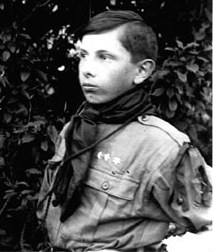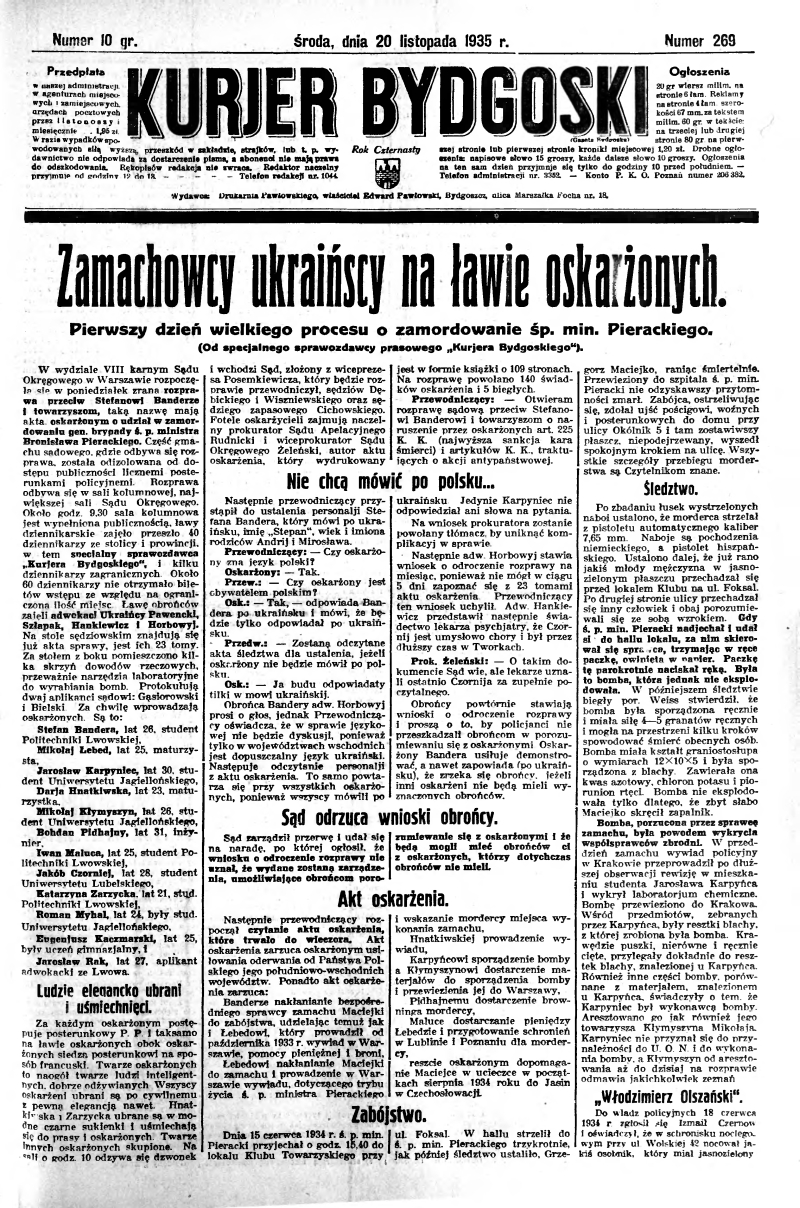|
Stepan Bandera
Stepan Andriyovych Bandera ( uk, Степа́н Андрі́йович Банде́ра, Stepán Andríyovych Bandéra, ; pl, Stepan Andrijowycz Bandera; 1 January 1909 – 15 October 1959) was a Ukrainian far-right leader of the radical, terrorist wing of the Organization of Ukrainian Nationalists named OUN-B. Bandera was born in the Austro-Hungarian Empire, in Galicia, into the family of a priest of the Ukrainian Greek Catholic Church. Involved in nationalist organizations from a young age, Bandera was sentenced to death for his involvement in the 1934 assassination of Poland's Minister of the Interior Bronisław Pieracki, commuted to life imprisonment. Freed from prison in 1939 following the invasion of Poland, Bandera prepared the 30 June 1941 Proclamation of Ukrainian statehood in Lviv, pledging to work with Germany after Germany invaded the Soviet Union on 22 June 1941. The Germans disapproved the proclamation and for his refusal to rescind the decree, Bandera was a ... [...More Info...] [...Related Items...] OR: [Wikipedia] [Google] [Baidu] |
Organization Of Ukrainian Nationalists
The Organization of Ukrainian Nationalists ( uk, Організація українських націоналістів, Orhanizatsiya ukrayins'kykh natsionalistiv, abbreviated OUN) was a Ukrainian ultranationalist political organization established in 1929 in Vienna. The OUN was the largest and one of the most important far-right Ukrainian organizations operating in the Kresy region (Eastern Galicia) of the Second Polish Republic. OUN emerged as a union between the Ukrainian Military Organization, smaller radical right-wing groups, and right-wing Ukrainian nationalists and intellectuals represented by Dmytro Dontsov, Yevhen Konovalets, Mykola Stsiborskyi, and other figures. The ideology of the OUN has been described as similar to Italian Fascism. The OUN sought to infiltrate legal political parties, universities and other political structures and institutions. The OUN's strategies to achieve Ukrainian independence included violence and terrorism against perceived foreign a ... [...More Info...] [...Related Items...] OR: [Wikipedia] [Google] [Baidu] |
Assassination Of Bronisław Pieracki
The assassination of Bronisław Pieracki was a target killing of Poland's top politician of the interwar period, Minister of Interior Bronisław Pieracki (1895-1934), by the Organization of Ukrainian Nationalists (OUN). OUN was formed in Poland as an amalgamation of a number of extreme right-wing organizations, including the Union of Ukrainian Fascists. From the moment of its founding in 1929, fascism played a central role in the organization, combining extreme ethno-nationalism with terrorism, corporatism, and anti-Semitism. The chosen assassin, Hryhorij Maciejko pseudonym "Gonta", was a trusted member of OUN. History The assassination plan was decided at an OUN meeting in Berlin. Maciejko was supplied with a makeshift bomb and a 7.65mm caliber pistol from Bandera. In the morning of 15 June 1934 Maciejko (aged 31) appeared at the Foksal Street in Warsaw in front of a social club frequented by Pieracki. He waited there for several hours undetected. The minister arrived in his l ... [...More Info...] [...Related Items...] OR: [Wikipedia] [Google] [Baidu] |
Fascist
Fascism is a far-right, Authoritarianism, authoritarian, ultranationalism, ultra-nationalist political Political ideology, ideology and Political movement, movement,: "extreme militaristic nationalism, contempt for electoral democracy and political and cultural liberalism, a belief in natural social hierarchy and the rule of elites, and the desire to create a (German: “people’s community”), in which individual interests would be subordinated to the good of the nation" characterized by a dictatorial leader, centralized autocracy, militarism, forcible suppression of opposition, belief in a natural social hierarchy, subordination of Individualism, individual interests for the perceived good of the nation and race, and strong regimentation of society and the economy. Fascism rose to prominence in early 20th-century Europe. The first fascist movements Italian Fascism, emerged in Italy during World War I, before Fascism in Europe, spreading to other European countries, most n ... [...More Info...] [...Related Items...] OR: [Wikipedia] [Google] [Baidu] |
Basic Books
Basic Books is a book publisher founded in 1950 and located in New York, now an imprint of Hachette Book Group. It publishes books in the fields of psychology, philosophy, economics, science, politics, sociology, current affairs, and history. History Basic Books originated as a small Greenwich Village-based book club marketed to psychoanalysts. Arthur Rosenthal took over the book club in 1950, and under his ownership it soon began producing original books, mostly in the behavioral sciences. Early successes included Ernest Jones's ''The Life and Work of Sigmund Freud'', as well as works by Claude Lévi-Strauss, Jean Piaget and Erik Erikson. Irving Kristol joined Basic Books in 1960, and helped Basic to expand into the social sciences. Harper & Row purchased the company in 1969. In 1997, HarperCollins announced that it would merge Basic Books into its trade publishing program, effectively closing the imprint and ending its publishing of serious academic books. That same year, Bas ... [...More Info...] [...Related Items...] OR: [Wikipedia] [Google] [Baidu] |
Vasili Mitrokhin
Vasili Nikitich Mitrokhin (russian: link=no, Васи́лий Ники́тич Митро́хин; March 3, 1922 – January 23, 2004) was a major and senior archivist for the Soviet Union's foreign intelligence service, the First Chief Directorate of the KGB, who defected to the United Kingdom in 1992 after providing the British embassy in Riga with a vast collection of his notes purporting to be written copies of KGB files. These became known as the Mitrokhin Archives. The intelligence files given by Mitrokhin to the MI6 exposed an unknown number of Soviet agents, including Melita Norwood. He was co-author with Christopher Andrew of ''The Mitrokhin Archive: The KGB in Europe and the West'', a massive account of Soviet intelligence operations based on copies of material from the archive. The second volume, ''The Mitrokhin Archive II: The KGB in the World'', was published in 2005, soon after Mitrokhin's death. Education Mitrokhin was born in Yurasovo, in Central Russia, R ... [...More Info...] [...Related Items...] OR: [Wikipedia] [Google] [Baidu] |
Christopher Andrew (historian)
Christopher Maurice Andrew, (born 23 July 1941) is an Emeritus Professor of Modern and Contemporary History at the University of Cambridge with an interest in international relations and in particular the history of intelligence services. Andrew is Professor of Modern and Contemporary History, former Chair of the History Faculty at Cambridge University, Official Historian of the Security Service (MI5), Honorary Air Commodore of 7006 (VR) Intelligence Squadron in the Royal Auxiliary Air Force, Chairman of the Cambridge Intelligence Seminar, and former Visiting Professor at Harvard, Toronto and Canberra. Andrew served as co-editor of ''Intelligence and National Security'', and a presenter of BBC radio and TV documentaries, including the Radio Four series ''What If?''. His twelve previous books include a number of studies on the use and abuse of secret intelligence in modern history. Life He is currently a governor of Norwich School where in the 1950s he was a pupil, and has r ... [...More Info...] [...Related Items...] OR: [Wikipedia] [Google] [Baidu] |
British Intelligence Agencies
The Government of the United Kingdom maintains intelligence agencies within three government departments, the Foreign Office, the Home Office and the Ministry of Defence. These agencies are responsible for collecting and analysing foreign and domestic intelligence, providing military intelligence, and performing espionage and counter-espionage. Their intelligence assessments contribute to the conduct of the foreign relations of the United Kingdom, maintaining the national security of the United Kingdom, military planning and law enforcement in the United Kingdom. The four main agencies are the Secret Intelligence Service (SIS or MI6), the Security Service (MI5), the Government Communications Headquarters (GCHQ) and Defence Intelligence (DI). The history of the organisations dates back to the 19th century. The decryption of the Zimmermann Telegram in 1917 was described as the most significant intelligence triumph for Britain during World War I, and one of the earliest occasions ... [...More Info...] [...Related Items...] OR: [Wikipedia] [Google] [Baidu] |
Anti-Bolshevik Bloc Of Nations
Anti-Bolshevik Bloc of Nations (ABN) was an international ultra-nationalist organization founded as a coordinating center for anti-communist and nationalist émigré political organizations from Soviet and other socialist countries. The ABN formation dates back to a conference of representatives of non-Russian peoples that took place in November 1943, near Zhytomyr as the Committee of Subjugated Nations/the Anti-Bolshevik Front on the initiative of the Organization of Ukrainian Nationalists. It dissolved in 1996. History Origins In the 1930s, in the region of Galicia which at the time belonged to Poland, the Organization of Ukrainian Nationalists (OUN) had emerged among the Ukrainians of Galicia to fight for independence from Poland. In turn, the OUN had received support from the ''Abwehr'', German military intelligence, in its struggle against Poland, marking the beginning of a relationship with Germany that continued into World War Two. Alfred Rosenberg, the Minister of the Eas ... [...More Info...] [...Related Items...] OR: [Wikipedia] [Google] [Baidu] |
Anti-communist
Anti-communism is Political movement, political and Ideology, ideological opposition to communism. Organized anti-communism developed after the 1917 October Revolution in the Russian Empire, and it reached global dimensions during the Cold War, when the United States and the Soviet Union engaged in an intense rivalry. Anti-communism has been an element of movements which hold many different political positions, including conservatism, fascism, liberalism, nationalism, social democracy, libertarianism, or the anti-Stalinist left. Anti-communism has also been expressed in #Objectivists, philosophy, by #Religions, several religious groups, and in #Literature, literature. Some well-known proponents of anti-communism are #Former communists, former communists. Anti-communism has also been prominent among movements #Evasion of censorship, resisting communist governance. The first organization which was specifically dedicated to opposing communism was the Russian White movement which foug ... [...More Info...] [...Related Items...] OR: [Wikipedia] [Google] [Baidu] |
Gestapo
The (), abbreviated Gestapo (; ), was the official secret police of Nazi Germany and in German-occupied Europe. The force was created by Hermann Göring in 1933 by combining the various political police agencies of Prussia into one organisation. On 20 April 1934, oversight of the Gestapo passed to the head of the ''Schutzstaffel'' (SS), Heinrich Himmler, who was also appointed Chief of German Police by Hitler in 1936. Instead of being exclusively a Prussian state agency, the Gestapo became a national one as a sub-office of the (SiPo; Security Police). From 27 September 1939, it was administered by the Reich Security Main Office (RSHA). It became known as (Dept) 4 of the RSHA and was considered a sister organisation to the (SD; Security Service). During World War II, the Gestapo played a key role in the Holocaust. After the war ended, the Gestapo was declared a criminal organisation by the International Military Tribunal (IMT) at the Nuremberg trials. History After Adol ... [...More Info...] [...Related Items...] OR: [Wikipedia] [Google] [Baidu] |
Operation Barbarossa
Operation Barbarossa (german: link=no, Unternehmen Barbarossa; ) was the invasion of the Soviet Union by Nazi Germany and many of its Axis allies, starting on Sunday, 22 June 1941, during the Second World War. The operation, code-named after Frederick Barbarossa ("red beard"), a 12th-century Holy Roman emperor and German king, put into action Nazi Germany's ideological goal of conquering the western Soviet Union to repopulate it with Germans. The German aimed to use some of the conquered people as forced labour for the Axis war effort while acquiring the oil reserves of the Caucasus as well as the agricultural resources of various Soviet territories. Their ultimate goal was to create more (living space) for Germany, and the eventual extermination of the indigenous Slavic peoples by mass deportation to Siberia, Germanisation, enslavement, and genocide. In the two years leading up to the invasion, Nazi Germany and the Soviet Union signed political and economic pacts for st ... [...More Info...] [...Related Items...] OR: [Wikipedia] [Google] [Baidu] |


.jpg)




.jpg)